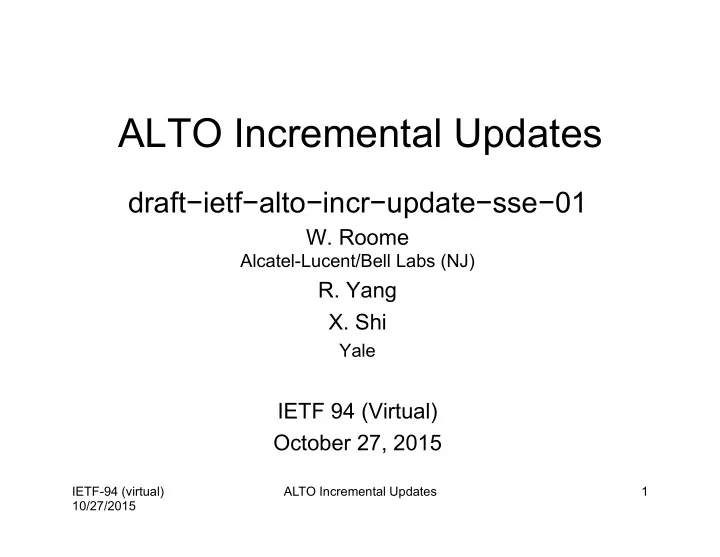

ALTO Incremental Updates draft − ietf − alto − incr − update − sse − 01 W. Roome Alcatel-Lucent/Bell Labs (NJ) R. Yang X. Shi Yale IETF 94 (Virtual) October 27, 2015 IETF-94 (virtual) ALTO Incremental Updates 1 10/27/2015
Summary • General framework for updates to any ALTO resource – Including Endpoint Cost & Property Services – Provides continuous updates, which may be full or incremental • Server defines one or more Update Stream resources – Continuous stream of update messages for a resource set – One stream may update several resources (network + cost maps) • Update Streams are optional & flexible – Server can offer updates for some, all or none of its resources • Uses Server-Send Events (SSEs) over HTTP/1.1 • Approved as WG draft (IETF 93, March 2015) • Test server: http://alto.alcatel-lucent.com:8000/directory IETF-94 (virtual) ALTO Incremental Updates 2 10/27/2015
Changes Since Version -00 • Added selective stop – More graceful than just closing stream • Update Stream resource accepts two requests: – start-updates establishes a stream, as before: "start-updates": {"network-map":{}, "cost-map":{}} � – stop-updates tells server to stop some or all updates: "stop-updates": {"stream-id": " XXXXXXX ", � "resources": ["cost-map"] } – Note: Version -01 uses different syntax; this is clearer – Client sends stop-updates request on a new TCP stream (SSE is one-way stream, server -> client) • Server assigns unique stream-id for each update stream – Server returns as first event in stream – Client uses in stop-updates to identify stream IETF-94 (virtual) ALTO Incremental Updates 3 10/27/2015
Status & Experience • SSE issues: – SSE designed for events with small amounts of line-oriented text – Full cost map could be a 10-megabyte “line” – ALTO Server: inject new-lines periodically – ALTO Client: use SSE library which returns lines as they arrive • “Updates” may give same value: – Example: When network map changes, easier to send full cost map than determine which costs actually changed • Incremental updates issues: – Can be very difficult for server to decide what changed – Ordinal costs: You cannot change just one! – ECS via PID costs: new network map -> every cost might change – Filtered cost map with constraint test – Result: Server may send “unnecessary” full-replacement updates IETF-94 (virtual) ALTO Incremental Updates 4 10/27/2015
So What’s Next? • Incremental update is a WG charter item – and it’s late! • Next steps? – Update to draft -02 (cosmetic, barring substantive comments) – Do off-line interop tests with other clients & servers? – Interested parties read the draft? • Or should we just wait for HTTP/2? – Would eliminate stream-ids and associated security issues – But we would still use SSE; HTTP/2 “server push” does NOT help – Disadvantage: HTTP/2 is much more complicated than HTTP/1.1 – Library support (client & server) is spotty IETF-94 (virtual) ALTO Incremental Updates 5 10/27/2015
Backup Slides IETF-94 (virtual) ALTO Incremental Updates 6 10/27/2015
Alternatives • Use HTTP/2 (RFC 7540) instead of SSE – Affects transport; does not change update format • Pluses: – IETF Standard – Should be widely supported – eventually • Minuses: – Much more complex than HTTP/1.1 – Not yet widely supported in libraries – HTTP proxies must support HTTP/2 • Recommendation: – We need incremental update NOW – Offer HTTP/2 version when support becomes common IETF-94 (virtual) ALTO Incremental Updates 7 10/27/2015
Recommend
More recommend